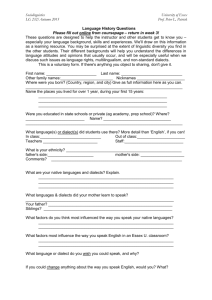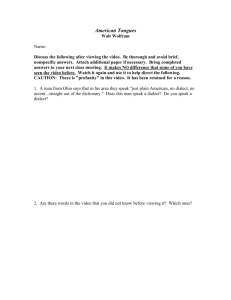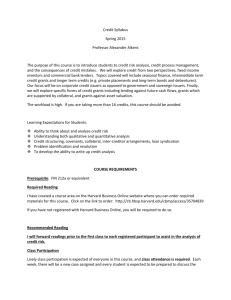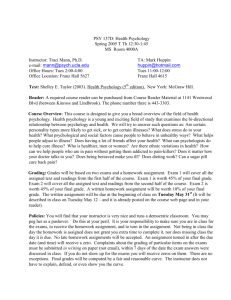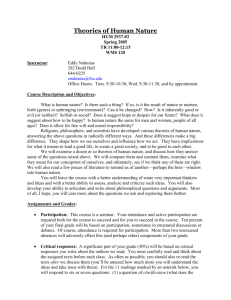Syllabus
advertisement
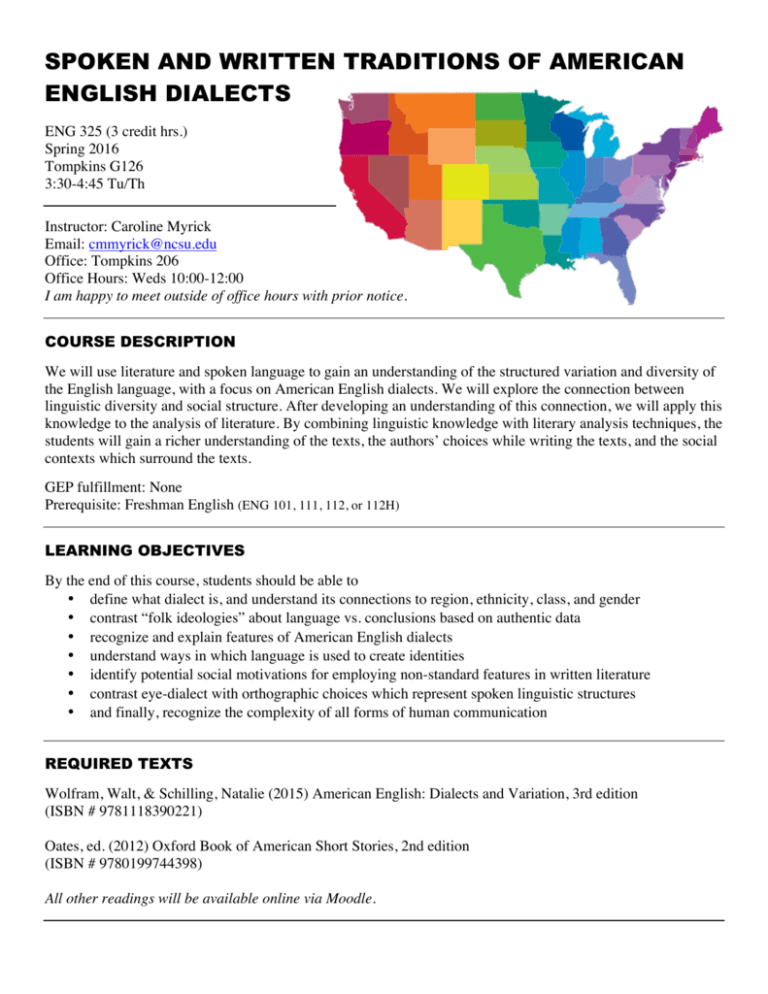
SPOKEN AND WRITTEN TRADITIONS OF AMERICAN ENGLISH DIALECTS ENG 325 (3 credit hrs.) Spring 2016 Tompkins G126 3:30-4:45 Tu/Th Instructor: Caroline Myrick Email: cmmyrick@ncsu.edu Office: Tompkins 206 Office Hours: Weds 10:00-12:00 I am happy to meet outside of office hours with prior notice. COURSE DESCRIPTION We will use literature and spoken language to gain an understanding of the structured variation and diversity of the English language, with a focus on American English dialects. We will explore the connection between linguistic diversity and social structure. After developing an understanding of this connection, we will apply this knowledge to the analysis of literature. By combining linguistic knowledge with literary analysis techniques, the students will gain a richer understanding of the texts, the authors’ choices while writing the texts, and the social contexts which surround the texts. GEP fulfillment: None Prerequisite: Freshman English (ENG 101, 111, 112, or 112H) LEARNING OBJECTIVES By the end of this course, students should be able to • define what dialect is, and understand its connections to region, ethnicity, class, and gender • contrast “folk ideologies” about language vs. conclusions based on authentic data • recognize and explain features of American English dialects • understand ways in which language is used to create identities • identify potential social motivations for employing non-standard features in written literature • contrast eye-dialect with orthographic choices which represent spoken linguistic structures • and finally, recognize the complexity of all forms of human communication REQUIRED TEXTS Wolfram, Walt, & Schilling, Natalie (2015) American English: Dialects and Variation, 3rd edition (ISBN # 9781118390221) Oates, ed. (2012) Oxford Book of American Short Stories, 2nd edition (ISBN # 9780199744398) All other readings will be available online via Moodle. CLASSROOM EXPECTATIONS Students are expected to show respect to their classmates and instructor by • arriving to class on time • reading the assigned reading prior to class • bringing the assigned reading to class in paper form • refraining from the use of electronic devices • being mindful of different backgrounds and points of view ATTENDANCE The instructor follows university policies regarding excused absences. See: https://policies.ncsu.edu/regulation/reg-02-20-03 Students with excused absences should contact the instructor as soon as possible. Work missed due to an excused absence is due within 7 days of the original due date. After 4 unexcused absences, your class participation grade will be lowered 10 points for each additional unexcused absence. Students who arrive more than 5 minutes late to class will be marked absent. GRADING (1000 pts. total) 200 pts. – Assignments and pop quizzes All homework is due at the start of class on the day it is due. Late work will receive half-credit. Pop quizzes regarding the assigned reading will be given at the beginning of class and will have a time limit. You cannot makeup quizzes that you miss or are late to (unless prior arrangements are made, or absence is excused). 100 pts. – Class presentation During the literature section of the class, you will be required to signup to become an “expert” on one of the assigned readings. Your responsibilities for that day include researching either or both the author’s life and the piece of literature, and coming up with a few questions to initiate discussion. You will turn in your notes/ research for evaluation. More info will be provided about this assignment on a separate assignment sheet. 200 pts. – Midterm exam Assessment of sociolinguistics and spoken dialects. 200 pts. – Final exam Assessment mainly of the course’s literature component, but will necessarily draw on the information in the spoken dialects part of the course. 250 pts. – Two Papers • Paper 1 (100 pts) a 4-5 page paper that engages two academic articles on a dialects. You are to engage the ideas presented in the articles, as well as make connections between course content and the articles you select. Specific instructions will be posted on Moodle. Due February 23. • Paper 2, (150 pts) a 7-8 page paper on the use of dialect in a “local color” short story that is not covered in class. You are to discuss the ways this dialect functions in the story in relation to such themes as race, ethnicity, gender, class, and/or region. Specific instructions will be posted on Moodle. Due April 17. 50 pts. – Class participation This is a discussion-based course. Class participation is evaluated based on your contributions to class discussions. Factors affecting participation include the following: attending class, arriving on time, being prepared for class, and contributing frequently to our discussions in meaningful ways, e.g., making insightful comments, raising important questions. [See also attendance policy re. absences and participation pts.] Date Topic Reading/Assignment Due PART I: Analyzing Spoken Dialect Thur, Jan. 7 Course introduction Tues, Jan. 12 Course introduction No Class [instructor is at a conference] *View video online* Assignment #1 due Thur, Jan. 14 Language diversity & dialects Chapter 1, American English (AE) Tues, Jan. 19 Chapter 2, pp.27-40, AE Tues, Feb. 9 Why are there dialects? Social & historical reasons Why are there dialects? Linguistic reasons & processes Levels of dialect: Lexical & phonological variation Levels of dialect: Lexical & phonological variation Levels of dialect: Grammatical variation Levels of dialect: Grammatical variation Language variation in the U.S. Thur, Feb. 11 Regional varieties Chapter 5, AE Tues, Feb. 16 Social varieties Chapter 6, AE Thur, Feb. 18 Chapter 7, pp.183-199, AE Tues, March 1 Ethnic varieties: Latino English, Cajun English Ethnic varieties: Lumbee, Jewish, and Asian English Ethnic varieties: African American English Language and gender Thur, March 3 Language and style Chapter 10, AE Thur, Jan. 21 Tues, Jan. 26 Thur, Jan. 28 Tues, Feb. 2 Thur, Feb. 4 Tues, Feb. 23 Thur, Feb. 25 Tues, March 8 Thur, March 11 Tues, March 15 Thur, March 17 Chapter 2, pp.40-57, AE Study pp. xiv-xv Chapter 3, pp.61-79, AE Start studying appendix Chapter 3, pp.61-79, AE Study appendix Chapter 3, pp.79-93, AE Study appendix Chapter 3, pp.79-93, AE Study appendix Chapter 4, AE Chapter 7, pp.199-210 AE Chapter 8, AE Chapter 9, AE Spring Break: No Classes Catch up & Exam review MIDTERM EXAM PT. II: ANALIZING WRITTEN DIALECT Tues, March 22 Introduction to Literary Dialects “Regionalism and Local Color” [expect pop quizzes during the rest of the semester] http://public.wsu.edu/~campbelld/amlit/lc olor.html Thur, March 24 The South Tues, March 29 African Americans Thur, March 31 African Americans OBASS: “The Sherriff’s Children” (Chestnutt) OBASS: “A Late Encounter with the Enemy” (O’Connor) & “Where Is the Voice Coming from?” (Welty) OBASS, “The Man Who was Almost a Man” (Wright) & “Red-Headed Baby” (Hughes) On Moodle: “Sweat” (Hurston) & “Uncle Remus Stories” (Harris) OBASS: “Old Woman Magoun” (Freeman) & “A White Heron” (Jewett) OBASS: “The Storm” (Chopin) “The Praline Woman” (Nelson) Tues, April 5 New England Thur, April 7 New Orleans Tues, April 12 The West OBASS: “An Ingénue of the Sierras” (Harte) Thur, April 14 Tues, April 19 Thur, April 21 Tues, April 26 Immigrants Immigrants Catch up & Exam Review Reading Day: No Class OBASS: (Tan) & (Cisneros) OBASS: (Mukherjee) TBA Thur, April 28 FINAL EXAM @ 1:00 PM www.readbookonline.net/readOnLine/4287/ STUDENTS WITH DISABILITIES Reasonable accommodations will be made for students with verifiable disabilities. In order to take advantage of available accommodations, students must register with Disability Services for Students at 1900 Student Health Center, Campus Box 7509, 515-7653. For more information on NC State's policy on working with students with disabilities, please see the following website: http://policies.ncsu.edu/regulation/reg-02-20-01 ACADEMIC INTEGRITY It is the instructors’ understanding and expectation that the student’s signature, typed, or written name on any assignment means that the student pledges, “I have neither given nor received unauthorized aid on this test or assignment.” The students in this class are expected to adhere to the student code of conduct at all time. More information can be found at: http://policies.ncsu.edu/policy/pol-11-35-01 The student code of conduct defines cheating as: “…the giving, taking, or presenting of information or material by a student that unethically or fraudulently aids oneself or another person on any work which is to be considered in the determination of a grade or the completion of academic requirements or the enhancement of that student’s record or academic career.” (Student code of conduct 8.2) The instructor will uphold the student code of conduct. Violations of the code of conduct will be reported immediately to Judicial Programs, as is required of instructors by the NCSU system, and can result in failure of the course and suspension for the academic semester for first time violations. Violations may appear on a permanent record which can adversely affect your chances at future employment and/or ability to get into graduate programs. Other possible consequences include: a) a failing grade b) suspension for at least one semester c) educational assignment regarding the violation. Students may only collaborate on homework when expressed written permission is included by the instructor in the assignment, and collaborators must be identified. Any work used that is not produced by the student must be cited. Students are NOT permitted to collaborate on exams. Students may not receive assistance of any kind during exams without the consent of the instructor. Students must report all resources used to complete assignments, even if not directly quoted, using appropriate citation in a works cited page at the end of the assignment. Plus/minus grading will be used: A+ 97-100; A 93-96.99; A- 90-92.99; B+ 87-89.99, etc.


